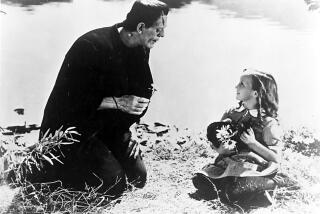BOOK REVIEW : Tragic Triangle in Hardy’s West Country : War Babies by Frederick Busch (New Directions: $15.95; 114 pages.)
- Share via
Thomas Hardy’s West Country and his vision of an implacable fate are compass points for Frederick Busch’s horrifying and lovely novella; but the journey is his own.
The struggle of two young people to assert their own lives is collapsed by an undertow from the past. Busch makes his strugglers as salt and bracing as breakers on a beach; the man who destroys them is a creature from the depths.
Peter Santore is one of the war babies of the title. An American lawyer, he comes to England seeking information about his father. The older Santore, a prisoner of war in Korea, turned coat, spied upon and abused his fellow prisoners, and was killed serving a subsequent jail sentence in the United States.
Peter has searched obsessively for details about his father. He comes to Salisbury to talk to the daughter of a British officer whose heroism in the same Korean prison camp led to his death.
Peter and Hilary Pennels meet and are powerfully attracted; they become lovers. There is a bit too much haste and an excess of coincidental detail; it is the initial wobble of a cyclist who then sets off on a breathtaking race.
Hilary is witty and sexy and has an appetite for life that makes us hungry as we watch her tuck in. There is a shadow that gives her an extra edge and urgency. As she takes Peter to her country cottage, as they spend nights there and at an inn in Salisbury, she takes the lead in defying it. Her father was the hero; Peter’s, the traitor who had some indirect part, at least, in his death. But they will ignore ghosts.
But this is Hardy country, and ghosts are not ignored. And Busch has created a living ghost. He is Fox, a former sergeant-major to Capt. Pennels, who survived his own ordeal, and witnessed his captain’s death and the treachery of the turncoat American.
Fox has appointed himself Hilary’s protector, and, as it turns out, something more. She, tough and free-spirited, wilts when he is around. This hard-muscled, dapper, graying man with a mouthful of rotting teeth possesses her in spite of herself. At the end, she will remain a prisoner of the past and Peter will retreat back to America.
It is a familiar archetype: the past as the present’s future. The author’s splendid voicing makes it new.
Doom is a messy subject to write; it spills easily and gets all over everything. Busch, one of our important writers, gives such life, energy and specific detail to his characters that they never become an author’s tools. Almost, we think, they have invented Busch.
Peter, as American innocent and, particularly, as the narrator who discovers the horror, is memorable. But the triumphs are Fox and Hilary.
Frightening at the start, by the end, Fox will become a stinking figure of death reaching out of the grave. His hold on Hilary, his threats to Peter are never simply symbolic. He beats his protege as he has sex with her; he makes it increasingly clear that he is willing to use violence on Peter, or even kill him. At the end, seeing him off at the airport, he plants a victorious and reeking kiss on his lips.
He is literally a dead soul. And Busch makes one of his violences the brutal sting of the English language as only the English can use it. “Butt out,” Peter tells him at one point, while he is still resisting. And Fox answers:
“Young Peter, you sound like an American joke. Butt out. I think the villain chap in the film you think you’re in, and of course I never mind playing the role of the villain chap--what else are sergeant-majors for? He’d say to you, ‘Who’s gonna make me?’ Now you have, as Americans here keep telling us, as if we mightn’t without their permission, you have a real good day.”
Most Vivid Character
Her language, so particularly English and so particularly hers, makes Hilary the most vivid of the three. Planning a treat--in this case, a meal, she loves to eat--she bubbles like a bubbly English child. She can turn from lovemaking to a brisk, no-nonsense interest in what’s next on the agenda. She is Peter Pan’s Wendy, Cleopatra and Mary Poppins, all in one. Somehow, all three are combined, along with a hip toughness, when Peter embraces her in the Salisbury Cathedral close, just after meeting Fox:
“Peter, English girls don’t do it in the fields in sight of Salisbury Cathedral any more. Not since the end of the last century, dear. Hotels, laddie. Lovely, anonymous hotels.”
Busch climaxes his taut balance of horror, playfulness, wit and hope with two scenes. In the first, Peter overhears Hilary, in bed with Fox, imitating his own voice and accent in what seems to be a terrible mockery. The second is a heartbreaking phone call in which Hilary tells him it was an attempt to cajole Fox away from killing him by pretending that she is on Fox’s side.
We are convinced. Peter cannot let himself be convinced; he would have to stay and fight. He is forced to recognize at the end that the same doom that holds Hilary a prisoner makes him too weak to rescue her. The recognition is sealed by Fox’s foul airport kiss.
“War Babies” is a tour de force and something else. After we catch our breath we remember more than the fact that we have lost it. We remember the living, the endearing, the sorrowful Hilary. Busch has written a glittering tragedy.
More to Read
The biggest entertainment stories
Get our big stories about Hollywood, film, television, music, arts, culture and more right in your inbox as soon as they publish.
You may occasionally receive promotional content from the Los Angeles Times.










